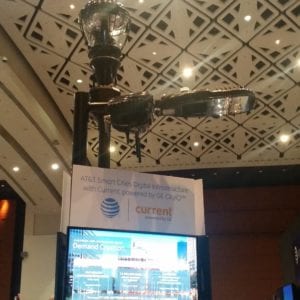As more “smart city” deployments come to life, city officials are increasingly seeking to get beyond the basics of connecting sensors and video cameras and thinking more about how to make the best use of the data coming from connected devices. This is part of a broader shift that is being called Smart Cities 2.0: from a focus on hardware and infrastructure, to software and big data.
Austin Ashe, general manager for intelligent cities at Current powered by GE, said that he saw “a lot of dialogue around Smart Cities 2.0” at last week’s Smart Cities Week conference in Washington D.C.
Ashe referred to the increasing momentum around not just infrastructure, but more attention being given to the platforms and software that cities need in order to handle the information coming in from their varying smart city deployments — which often start out as discrete use cases for public safety, smart parking, traffic management or utility applications.
GE, AT&T and Intel have partnered to provide a platform approach to smart city deployments which combines both hardware and software. On the show floor, a gleaming black pole held LED lighting as well as integrated antennas and sensors and cameras. The three companies hope that by combining multiple types of hardware with software, that they can serve as a platform for a broad range of smart city use cases — much like an operating system with downloadable apps, and also provides opportunities for cities to open up their data for wider development.

“The thing about a platform is that you don’t necessarily have to solve 100% of every single one of your challenges,” Ashe said, going on to add that a platform allows cities to iterate and explore different solutions rather than have to go through new procurement processes, and discover what works for them more rapidly through existing applications.
“The cities are also opening this data up to the broader community — like high school students, and universities, and entrepreneurs and software incubators that are building solutions,” Ashe said. “The cities are actual challenging them to come up with some ideas to help them build the apps. And so with a platform approach, you can easily navigate the landscape of finding the solution you want and acquiring it, from a professional or even a student.”
Watch the full interview with Ashe below, and read more of RCR Wireless News’ coverage from the show.

